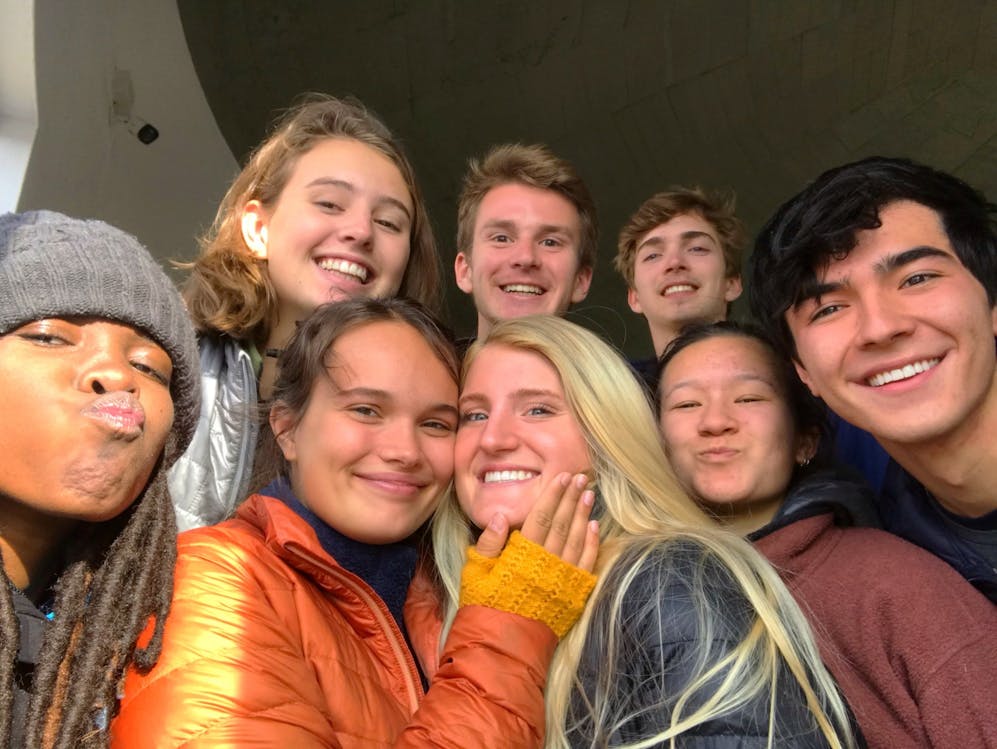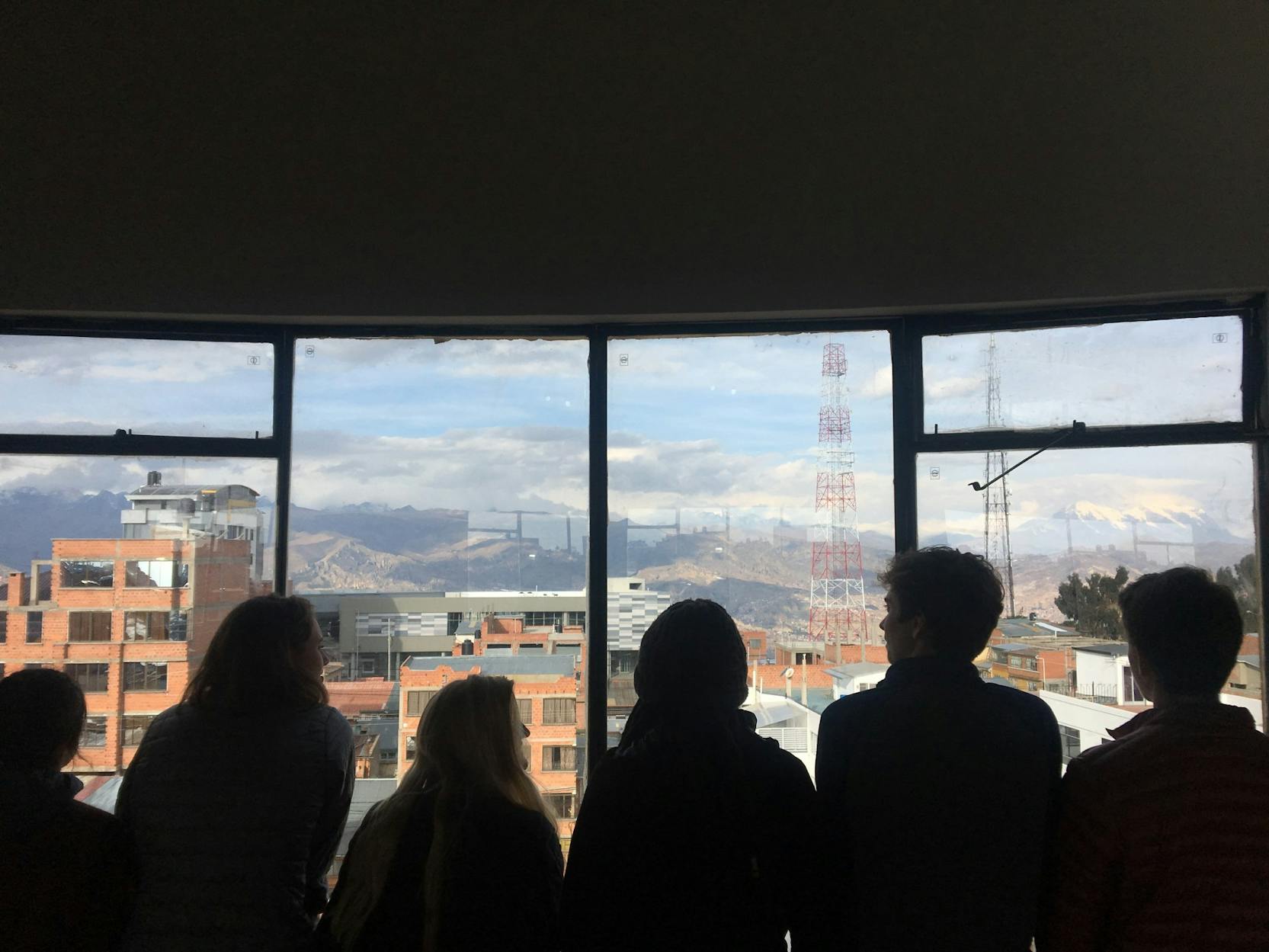
Courtesy of Mia Beams ’24
A year ago, the world seemed to be waiting for Mia Beams ’24, Chiara Vilna-Santos ’24, and Lauren “Flo” Fahlberg ’24. Tired of traditional education, the three freshly minted high school graduates resolved to spend a year learning outside the classroom, and the University’s Novogratz Bridge Year Program seemed a natural fit. All three were accepted, and all three spent the tail-end of their senior years anxiously preparing to spend nine months away from their families, living with strangers and immersing themselves in Bolivian culture and daily life.
What they couldn’t have prepared for: a political uprising and a global pandemic.
When the members of the 2019–20 Bridge Year Bolivia group arrived at Princeton in late August 2019 for orientation, they were warned about the political state in Bolivia. The students knew the upcoming presidential election in October was highly anticipated, but no one could have known how quickly controversy would spiral into chaos.
“We knew it was going to be a complicated election,” said Beams. “But it became so much more than that.”
Fahlberg laughs looking back at how the group first reacted to news of the election. The program’s assistant director, Matt Lynn, told the students it would be “a really interesting year to be on Bridge Year in Bolivia,” she recalled.
“I remember we were all just sitting there ... like, ‘Oh, this is going to be fun! We get to see the electoral process in another country!’” Fahlberg said. “Flash forward two months later...”
After a whirlwind first month of nonstop traveling through Bolivia, the students finally settled in with their host families in the small town of Tiquipaya, for what they thought would be the remainder of the time abroad. There they learned more of the controversy surrounding Evo Morales, the country’s longest-serving and first indigenous president, over dinner with their host families.

Photo Courtesy of Mia Beams ’24
On Oct. 20, 2019, Morales won the first round of the presidential election with a staggering 10 percent lead over his opponent, Carlos Mesa. Immediately, speculation that the election had been rigged in Morales’ favor spread throughout the country.
From the safety of Tiquipaya and through the worried voices of their host parents, the students began to see a nation reach its boiling point. Violent riots and protests swept cities across the country. Vilna-Santos remembers the fear she sensed in the community: “I think people were worried about their country, honestly.”
Although the students on the trip never faced imminent danger, the University began planning a temporary relocation of the group to Peru, especially as their emergency assistance provider issued warnings. Yet the very day before they were scheduled to leave, the embattled president suddenly resigned.
Beams recalls the moment it happened.
“I remember watching it on the TV when Evo Morales resigned. And my host brother — who usually stayed in his room — I remember hearing him swearing. My family was super bummed, and at that moment, it really hit me that Bolivia was really going to change from this,” she said.
For Vilna-Santos, the days surrounding Morales’ resignation were “an escalation” of confusion and uncertainty.
“First we were going to leave, but we weren’t sure when it was going to happen. Then it was this day, and then, ‘Oh no, it’s actually going to be in three days,’ and then right before we left, Evo resigned. Everyone was like, ‘Well, he resigned. Everything will be fine. We’ll be back in two weeks.’ And then we never came back,” she said.
In the middle of the night on Nov. 11, 2019, the Bridge Year group fled to Peru. Fahlberg, Vilna-Santos, and Beams all agreed the escape felt like a scene straight from the silver screen.
“The night we got out, it really seemed like we were in a movie. It was one or two in the morning, and we were just driving around blockades. I’ve never seen anything like that before. It was crazy,” Fahlberg recalled.
“It was kind of a ‘running away in the night’ type of vibe,” Vilna-Santos said. “We all went into a van, and it’s the middle of the night, and everything is super dark. There were only street lamps and leftovers of blockades. It was kind of chaotic, but also dead silent the whole time.”
They finally arrived at the airport after the grueling midnight journey. With nothing left to do but wait for their flight, the students huddled together on their backpacks and tried to get some rest.
Flash forward two weeks, and the group was still in Peru with no return to Bolivia in sight. Without their original curriculum, their host-families, their work sites, and their beloved Bolivia-based group leader, the students felt lost.
For Fahlberg, “this was definitely the hardest time during the trip — just not knowing what we were going to do or where we were going to go.”
“We were in limbo for probably a month … We didn’t know if we were going back. We were initially told that we were going to go to Peru for two weeks,” she explained.
New homestays. New work sites. New curriculum. November proved yet another hectic time for the Bridge Year Bolivia-turned-Peru group. Thrown once again into an unfamiliar environment, the students did their best to stay positive and hopeful. While their original plan had already run off its course, the students felt optimistic about the new one, thanks to what Fahlberg, Vilna-Santos, and Beams all recall as incredible care and support from the University.
A global pandemic had other plans.
In March, when the group heard they would need to be evacuated from Peru due to COVID-19, they chalked it up to bad luck. After all, they’d already escaped political turmoil in November — what’s one more time?
“Everyone was just like, ‘Well, we’re just going to have to do another Bolivia-type stealth mode evacuation,’” jokes Fahlberg.
“[In the first evacuation] everything was intense and insane, and we were all crying. But the second time we got evacuated, we were just like, ‘Yeah, I guess this was bound to happen,’” adds Vilna-Santos.
But this time, the prospect of a “stealth mode evacuation” suddenly fell out of reach.
Borders for international travel closed in Peru on March 15, just two days before the group was scheduled to return home. Beams remembers the group’s confusion regarding what the announcement meant for their return home:
“We were like, ‘We can still leave, we can still get out, even if all of the borders are closed, right?’ Then we went to the airport the next day and, surprise! We couldn’t leave.”
At that point, there was nothing the group could do but wait for a flight out. In 10 days, the uncertainty was finally over, as everyone boarded homebound flights. The University credited New Jersey Senator Robert Menendez, the State Department, and the staff of the Senate Committee on Foreign Relations for helping organize the flights.

Photo Courtesy of Mia Beams ’24
Today, Beams, Vilna-Santos, and Fahlberg are stuck in their homes, quarantining like the rest of the country and most of the world. In Massachusetts, California, and Washington D.C., respectively, they’re finishing out their gap year by spending time cooped up with their families and pets — a far cry from the adventurous, self-sufficient experience they’d once planned.
“The memory of [the trip], I think, lasts so much longer than everything else,” said Vilna-Santos. “Like, I have my whole high school life, and then I have these seven months of my life. And it takes up so much space in my consciousness as opposed to the 18 years that happened before that.”
So if they could have known, on that warm August day in Princeton, the chaos that lay in store, would they do it all over again?
For these three Princetonians: overwhelmingly, resoundingly, yes.
"really" - Google News
June 22, 2020 at 05:52AM
https://ift.tt/313KGK3
'It really seemed like we were in a movie': Bridge Year Bolivia, political tumult, and COVID-19 - The Daily Princetonian
"really" - Google News
https://ift.tt/3b3YJ3H
https://ift.tt/35qAk7d
Bagikan Berita Ini














0 Response to "'It really seemed like we were in a movie': Bridge Year Bolivia, political tumult, and COVID-19 - The Daily Princetonian"
Post a Comment